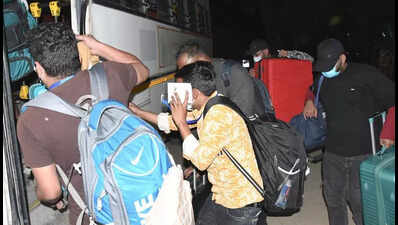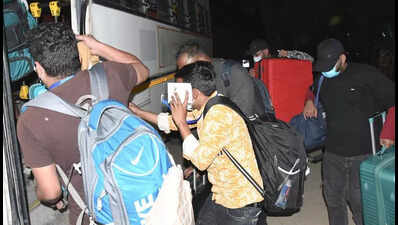- News
- City News
- lucknow News
- Victims of deceit trained to dupe in Myanmar
Trending
Victims of deceit trained to dupe in Myanmar
Lucknow: Deported recently from Myanmar, 21 youths from Uttar Pradesh gave an account of how they were tricked into executing cyber crime operations. The men, aged between 20 and 31, were among 540 Indian nationals rescued during a joint military operation by Myanmar-Thailand-China govts and were brought back home with the help of ministry of external affairs. The UP youths reunited with their families after extensive questioning by Lucknow Police Commissionerate.
The deportees said they were targeted through Telegram app, with agents posing as recruiters and promising them lucrative jobs in Thailand's data entry, sales & marketing and IT sectors, with a salary of 30,000 dollars (approx. Rs 25 lakh) annually.
The targets were asked to take a written examination in general knowledge, English language and miscellaneous subjects, giving the operatin semblance of a professional recruitment process. Those who passed the written test were even invited to Delhi for interview. Following their selection, the youths were issued what appeared to be genuine visas for Thailand.
In Oct 2024, the candidates flew to Bangkok and their ordeal began just a week later when they were moved illegally across Thailand-Myanmar border. They were taken to K K Park in Myawaddy, Myanmar, a notorious hub for cybercrime operations, where their passports were confiscated and they were placed under strict surveillance.
"The gang demanded 5,000 dollars (approx. Rs 4 lakh) ransom if they refused to cooperate, claiming that this amount was needed to recover the ‘investment' made in bringing them to Myanmar," said police. ACP, Crime, Abhinav Kumar said the men were shown instructional videos on conducting ‘digital arrest' scams and were coached to speak like law enforcement officials to dupe targets from USA, Canada, Australia and India into transferring large sums of money.
The men trapped in the racket were directed to create fake social media profiles, impersonating as attractive women to lure high-profile targets into false investment schemes. Initially, they would offer small profits to gain trust before convincing their targets to invest substantial amounts and scamming them of millions. Many victims invested heavily in this fake job opportunity, borrowing money or selling family assets. One man, who requested anonymity, shared his heart-wrenching experience. He had taken a loan to pursue a Bachelor of Computer Applications degree, believing this job would help him pay off his debts and support his family. His father, an e-rickshaw driver, had struggled to finance his education.
"The breakthrough in the case came following disappearance of Chinese actor Wang Xing (Xing Xing), which triggered a large-scale joint rescue operation by the Myanmar-Thailand-China govts in K K Park. During the raid, authorities found several victims from different countries who were forced into cybercrime operations," said ACP Kumar.
Those Uttar Pradesh natives rescued included Zia-ul-Haq, 29, from Ballia; Aqib Ahmed Khan, 26, from Varanasi; Atul Yadav, 25, from Auraiya; Alfez Ali, 25 and Firoz Alam, 25, from Kushinagar; Nawaz Ahmed, 29, from Ghazipur; Sadiq Mirza, 32, Mohammad Anas, 29, Tauseef (age not specified) and Sultan Salauddin Rabbani (age not specified) from Lucknow; Shahjahan Khan, 29, from Sonbhadra; Satyam Yadav, 23, from Jaunpur; Abhimanyu Singh, 30, Sonu Maurya, 25 and Sunil Kumar, 35, from Gonda; Chiranjivi Pandey, 30, and Abhishek Chauhan (age not specified) from Maharajganj; Yogendra Gautam (age not specified) from Pratapgarh; Abhinandan Gupta (age not specified) and Abrar Ali, 20, from Gorakhpur and Sushil Chaudhary, 31, from Mau.
End of Article
FOLLOW US ON SOCIAL MEDIA











